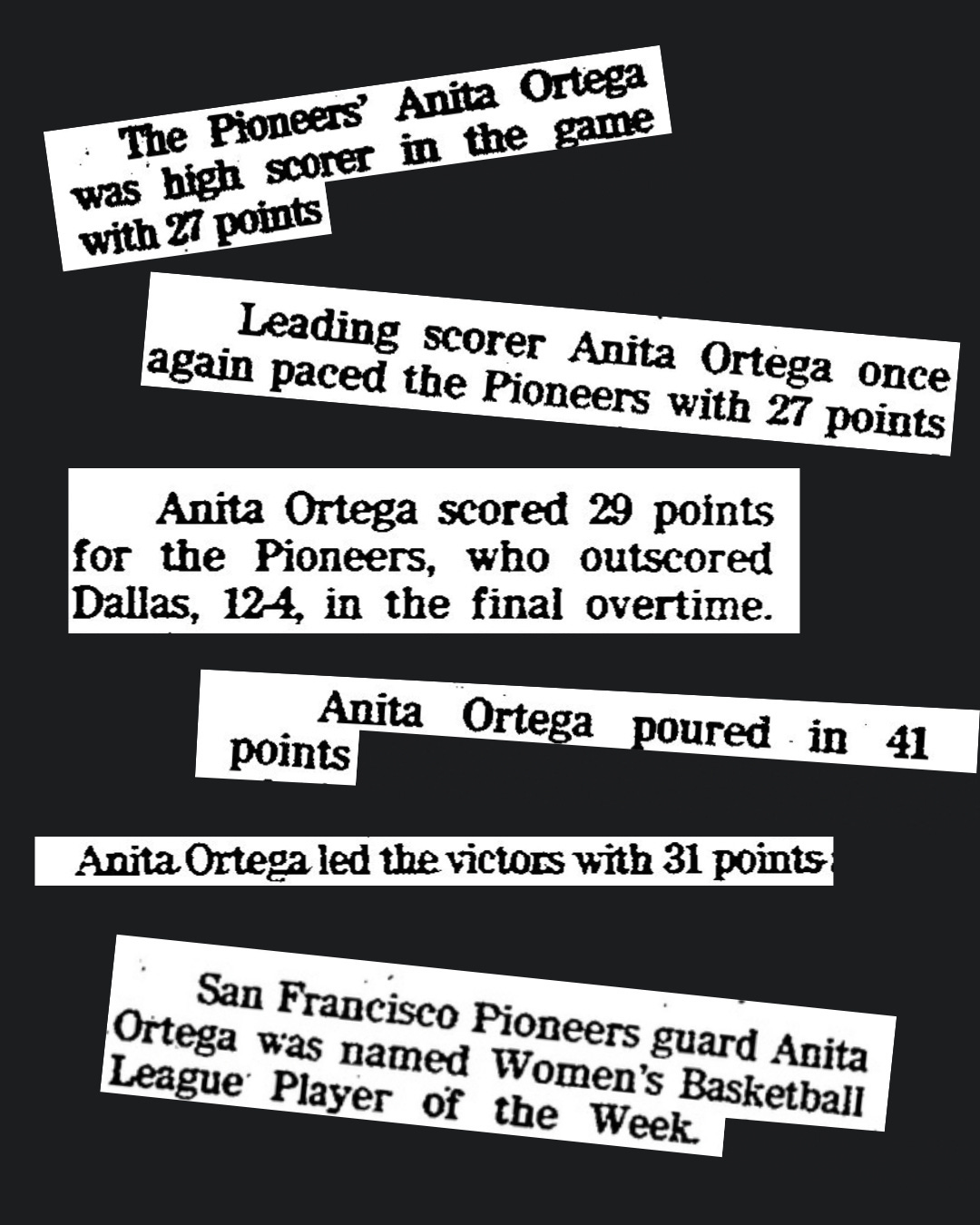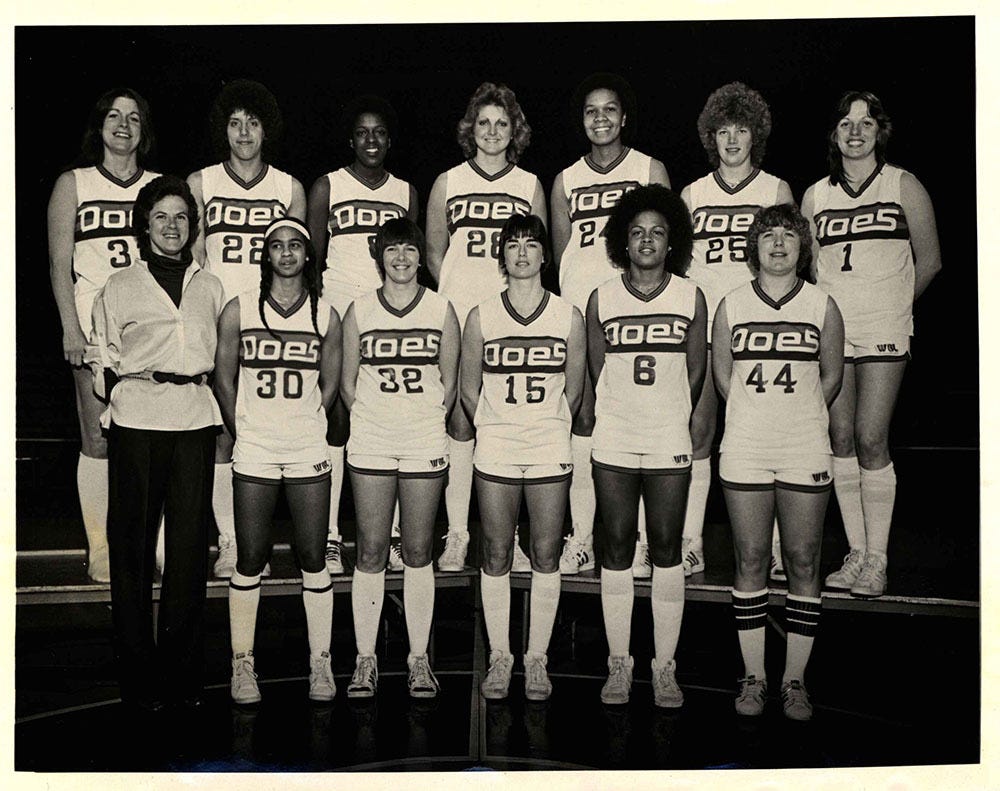Anita Ortega. Cardtie Hicks. Musiette McKinney. Anna Johnson. Gerry Booker. Roberta Williams.
These are just some of the talented Black women who played for the San Francisco Pioneers between 1979-81, part of the first pro women’s basketball league in the United States, known as the WBL. Decades before the Golden State Valkyries, these women made history. In so many ways, these players were also the core glue for the Pioneers. But for so long we’ve failed to amplify their names and their stories.
The Golden State Valkyries will honor the San Francisco Pioneers at their home game on Monday, July 14 (see you there!) I’ve been working on several stories about the Pioneers’ unprecedented reunion, and have been humbled to speak with 6 Black women who played on the team: Anita, Cardtie, Musiette, Anna, Gerry & Roberta. I’m beyond honored to help share the joys, resilience, pain and triumphs of their careers over the next month. Today, I want to introduce you to these women:
What’s clear about the WBL, to me, is that the league and its teams owned exclusively by white men) narrowly focused its marketing on white women. You can see this in the WBL’s advertisements, in the headlines, in four out of five of the “Players to Watch” according to the San Francisco Pioneers 1980-81 Yearbook being white women. And all too often, this same coverage gets recycled now in retellings of the WBL’s historical significance.
But the common front-lining of white players does not actually reflect what happened on the court, or behind-the-scenes. Scouring through the San Francisco Chronicle archives, buried in paragraphs of text already tucked into the back pages of the sports section, you can start to get a clearer picture of the team.
During the 1978-79 Pioneers season, one leader emerged on the court: Anita Ortega. Despite being drafted in the third round of the 1979 WBL draft, she outshined the women (both white) who were selected ahead of her. She played nearly every minute of every game, earning the nickname “Thoroughbred” from her coach. She was also an outstanding teammate, part of the core group of starters and leaders on the team, who shared meals and explored the Bay Area together, driving from Daly City to the East Bay while singing to Tina Turner.
Anita grew up in Los Angeles, where she waited on the sidelines of pick-up games at Toberman Park until the guys let her play. There, she got used to trash talking, physicality, and defying expectations. Just like Valkyries head coach Natalie Nakase, Anita walked on to the UCLA women’s basketball team, where she won the 1978 AIAW championship. She was fearless and focused and wholly dedicated to the game. And during the Pioneers first season, 1979-80, not only was she a WBL All Star, but she also was the Pioneers leading scorer, finishing with 867 points (nearly 300 more than anyone else.)
When I asked Anita how she’d like to be remembered as a player for the Pioneers, she said: “Simply as a person that gave her heart and soul to win. A person that wanted to contribute in all aspects of the game: as a scorer, as a rebounder, as a good teammate. Someone that just brought fire to the game. A true pioneer of professional basketball.” Anita was definitely all of those things, and more.
Then there’s the Pioneers’ own Cardtie Hicks (who back then went by Cardie), who made history well beyond San Francisco. In fact, Cardtie is reportedly the first woman to ever dunk in a pro basketball game. She did it while playing abroad in the Netherlands, before the WBL started, around 1978. (There’s no video footage, but I’m working with Cardtie to dig deeper into historical records of this tremendous moment!) At only 5’8’’, Cardtie had unbelievable hops, and was capable of swinging one-handed from the rim. She was also a talented singer, generous teammates, and played her entire career in the WBL for the Pioneers.

Another player often missing from Pioneers marketing materials is Gerry Booker, who made history on multiple WBL teams. In fact, she played in the first-ever pro women’s basketball game as a member of the Milwaukee Does, on “The day Milwaukee was the center of the women’s basketball world.” My friend Jimmy Gutierrez recently interviewed Gerry about her experience for a radio feature; in the story, you can hear Gerry’s incredible warmth, loud laugh, and love for the game. Incredibly, Gerry heard about the WBL and actually hitched a ride with a friend to the Midwest to show up for the Milwaukee tryout. Ultimately, she loves the West Coast best, and has lived in San Francisco since her days on the Pioneers.
And if you haven’t already, make sure you get to know Anna Johnson — also a member of the San Francisco Pioneers & the Bay Area’s first pro women’s basketball player. In May, she shared her story publicly for the first time, and was the first person to bang the GSV drum, decorated in purple & white, just ahead of the Valkyries regular season tip off:
Today, on Juneteenth, another sold-out crowd will inevitably fill Chase Center, potentially this time with an influx of fandom hell bent on nearly exclusively celebrating one white star of the league. Like so many other forms of “mainstream” (read: majority white) audiences, coverage of the WNBA is structured by racism. In a league that is predominately Black but still frames itself for white audiences, questions of who gets marketed, who gets praised, who winds up on the “wrong” end of the respectability discourse that sometimes overtakes women’s basketball — those are not simple questions at all. The WBL's history shows us how long the sport has been wrestling with them. Not only do Black stars of the WNBA today deserve better, but so do the Black women whose shoulders this sport stands on.











Great job covering this valuable history!!
Thank you, Maya. So glad to see this coverage. I didn’t know they were going to be honored at that upcoming game and I’m sorry I don’t live in the Bay Area to see it. I played in the WBL myself in those early years, and Anita, Cardtie, & Musiette were terrific players. Anita was also a star at UCLA, and I played against her there, too. It was an honor to know them & in two cases, to still be in touch 45 years later. Yes to lifting up Black women Pioneers.